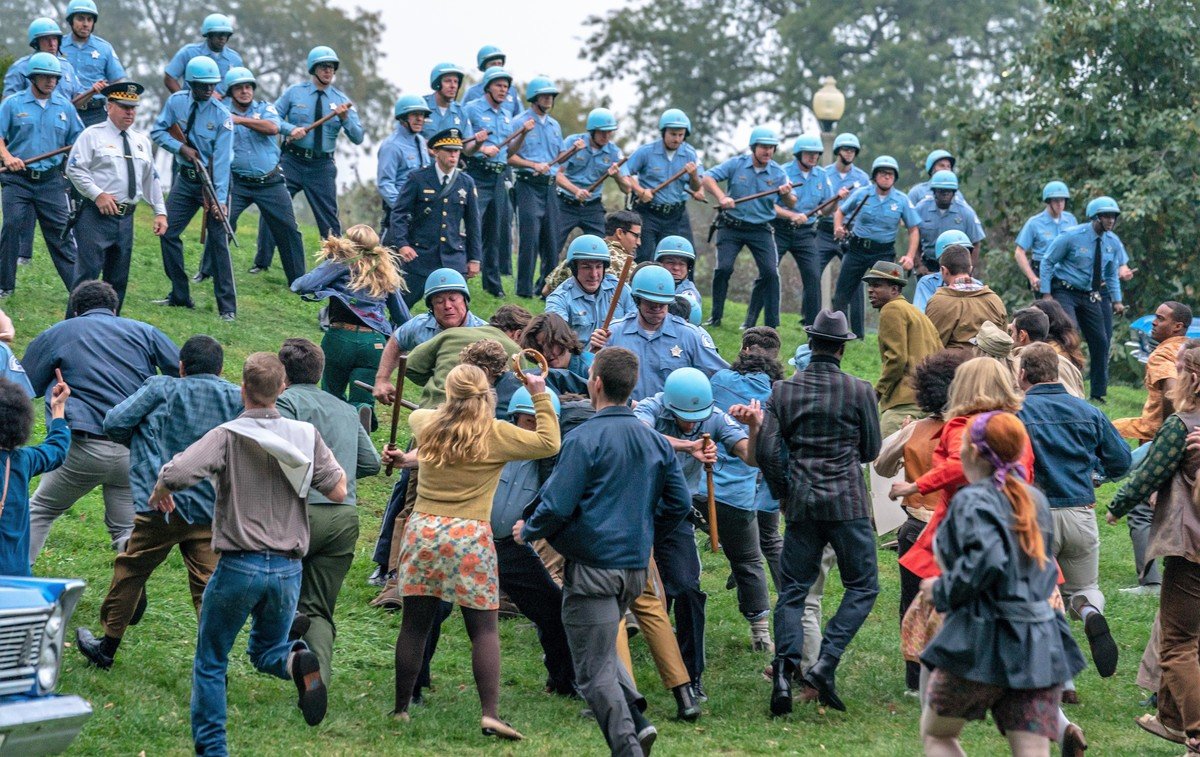

The Trial of the Chicago 7 (streaming on Netflix) is an intelligent, punchy, well-paced, and timely courtroom drama about a group of real-life 1960s political activists charged with inciting riots in protest of the Vietnam War.
Written and directed by Aaron Sorkin, the top-tier Hollywood talent behind A Few Good Men, The West Wing, and The Social Network, this feature marks his return from forays into sports and celebrity culture back to the topic of politics.
Consistently compelling and unabashedly partisan, Sorkin has a knack for representing left-leaning progressives at their best.
In this film even the radical left gets sympathetic treatment. Take, for instance, Rennie Davis and Abbie Hoffman, who are conspicuous hippies and leading activists with the Students for a Democratic Society, and two of the defendants in this trial.
They dress flamboyantly, make a mockery of the judicial proceedings, and unrepentantly flout conventional social expectations and moral norms. Yet, as depicted here, they remain enormously likeable.
Rennie never misses a beat with his snappy, off-the-cuff one-liners, and Abbie represents the sensitive-souled voice of humane compassion. We cannot help but appreciate them as individuals, even as they advocate open defiance of civic authority and muster students to protest around rallying cries of public fornication.
During the film, such radicals provide, on the one hand, for some comic relief, but they also function as foils for the more moderate defendants.
David Dellinger is also on trial, a conscientious objector and Boy Scout troop leader, along with Thomas Hayden (played by Eddie Redmayne), a much more composed and respectful representative of the Students for a Democratic Society than Rennie or Abbie.
Of all the characters under prosecution in this frequently raucous and unconventional trial, Hayden is the one who shows the most deference and optimism about advocating for reform within the constraints of the prevailing political system.
It is really this attitude that carries the weight of the film’s conviction.
And it is this general optimism in due process and commitment to reasoned discourse that might unite all good-willed watchers of this film, regardless of whether one happens to agree with any of the specific positions the characters adopt.
Indeed, in our own day when we see many arenas of politics increasingly stymied by entrenched polarities (the American arena, in particular), such confidence in the basic integrity and reformability of inherited systems is refreshing.
If more of us conducted ourselves more along these lines – with respectful disagreement, constructively channelled dissent, a preference for self-sacrifice over violent revolt – I daresay we would find ourselves living much more easily with many of our neighbours.
At the same time, it bears stressing that the attitude underlying this film is not any kind of kumbaya “let’s all hold hands and pretend to agree” kind of sentimentality. Not by a long shot.
Rather, its sentiments burn all the way down like a shot of half-throttled rage.
The kicker, though, is that it is rage someone can swallow. It is angry conviction not fired out of the end of a weapon or shattered blazing against cars and commercial buildings, but deeply considered and thoughtfully packaged and channelled through the pen.
It is no accident that The Trial of the Chicago 7 makes its appearance during the year of a federal election in the month that Americans go to the polls. Sorkin, no doubt, has served up this portion of revolutionary outrage with pointed political purpose.
Yet, however one might feel about its particular politics, as a model (in form as well as in content) of citizenship that focuses stalwart conviction into constructive cultural activity, what could be more pertinent for us all?
